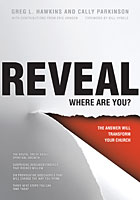 About ten years ago when the things going on at Willow Creek Community Church were a hot topic for conversation, and the "seeker sensitive" movement was gaining momentum, I had a conversation with one of the guys in my church where he said, "Chris, these guys are doing some really amazing things and some things that they're going to regret. Unfortunately, we won't know which is which for ten or fifteen years."
About ten years ago when the things going on at Willow Creek Community Church were a hot topic for conversation, and the "seeker sensitive" movement was gaining momentum, I had a conversation with one of the guys in my church where he said, "Chris, these guys are doing some really amazing things and some things that they're going to regret. Unfortunately, we won't know which is which for ten or fifteen years."Those were wise words.
And here we are, ten years later, and the verdict is in. Well, at least in part.
Greg Hawkins has been the Executive Pastor at Willow Creek for the past eleven years, and Cally Parkinson was the director of communications at Willow Creek prior to taking her new role in the brand management wing of the Willow Creek Association. And their new book "Reveal, where are you?" is a look behind the scenes at several conversations going on at Willow Creek as they have begun an intentional look at how things are really going at Willow Creek.
Although you may not agree with the "seeker sensitive" strategy, or many of the things Bill Hybels has championed over the past several years, it is virtually impossible to not respect the guy. On multiple occasions, I've heard Hybels stand up on platforms and admit, "we never saw that coming," or "we could have done that better" about various things Willow Creek has done (or not done). Though I've never met him personally, I deeply respect the humility it takes to allow a book to be written by one of your staff members that highlights the warts, blemishes, and misses of your leadership team.
If nothing else, this book is the most visually appealing book I've ever read. The graphics, charts, and color-coded chapters make this book read like a picture book, although the information contained within its pages are far from elementary.
At its core, this book seeks to help other churches gain the right tools for measuring actual growth of its members rather than simply measuring growth of attendance. It aims to help churches think in terms of measuring those things that are less tangible and more difficult to observe about a church's success, like life change. The book tracks the evaluation process of Willow Creek Church as they looked at how successful they were at being a part of helping Christians grow at several different points along the Christian growth continuum.
To make a long story short, it seems Willow was doing a great job with brand new believers, and growing believers, but a lousy job with mature believers. And to make things worse, the mature believers were the ones who were most apt to help reach the seekers the church sought to reach. Come to find out, it isn't new believers who do the best job evangelizing seekers - it's Christ-Centered mature believers who do the best job evangelizing seekers. What's worse, they found that the mature and maturing believer was extremely dissatisfied with the local church because they had never learned to do ministry - rather they were noticing that the church didn't have anything to offer them. Rather than commissioning the mature believers into the world, Willow was trying to keep them in the church, and was losing the battle.
Though Hawkins and Parkinson don't verbalize it this way, I think the issue boils down to this: For the last 10 or 15 years, Bill Hybels has said that the local church is the hope of the world. Now they're beginning to realize that it isn't. Jesus is the hope of the world, and Christians are supposed to reflect His light to the rest of the world. The church's responsibility is to figure out how best to train, equip, and mobilize believers to grow out of the local church so that (as maturing children) they are less and less dependent on the church meeting their needs, and more apt to be used in meeting the needs of others.
This is a short, relatively easy read, and is worth perusing for anyone who is curious about the state of the seeker-sensitive church in the twenty-first century. It contains some great insight, neat ideas, and will stretch you to think about where you are on the spiritual growth continuum. Like the seeker-sensitive movement ten years ago, you may not agree with everything these authors recommend, but you will definitely be challenged by their thinking to come up with something that helps your church (and you as an individual) become all it is intended to be.




1 comments:
Chris,
I enjoyed your post--balanced and helpful. I read another review that extrapolated a few comments and used them to make some pretty harsh statements against Willow Creek.
And your congregant is indeed very wise.
God bless.
Post a Comment